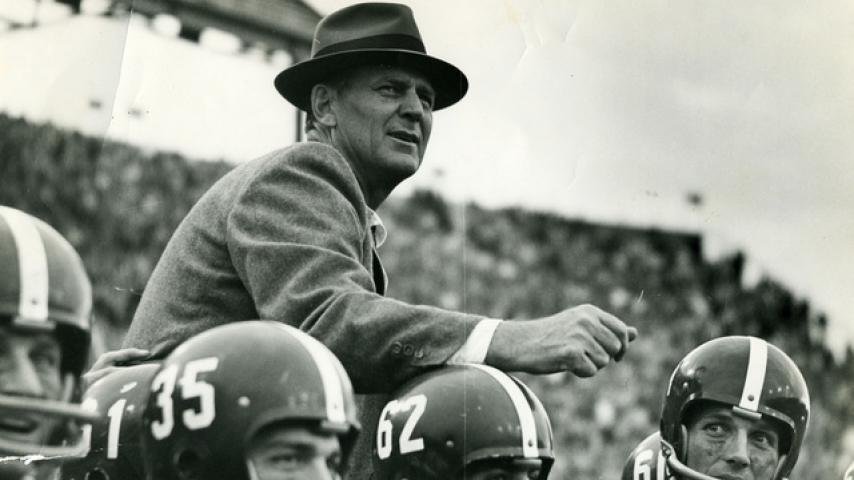Forty years after his death, Bryant's legacy still hard to match
Paul “Bear” Bryant passed away on this day, January 26, 1983, leaving a legacy that still lives in the hearts of Alabama fans today. (Courtesy University of Alabama/Paul Bryant Museum)
By GRAHAM DUNN
The majority of the older citizens in the country can probably recite where they were when they heard that President John F. Kennedy was assassinated in 1963.
The same is probably true in this part of the country regarding the news that Alabama football coach and icon Paul “Bear” Bryant passed away on this day, Jan. 26, 1983.
Forty years ago today, the news spread quickly, and not just in the state of Alabama. While the moment might not make the list of the “days of infamy” for some people, the majority of the state of Alabama stopped for several days to remember the man who was a living legend and greatest coach in college football history.
Bryant had died at 1:30 p.m. of a massive coronary arrest at a Tuscaloosa hospital.
He had been admitted to Druid City Hospital the day before complaining of chest pains. By 12:25 the day of his passing, the sudden loss of breathing lead to coronary arrest, according to reports that were released by the hospital.
Bryant was 69 when he died but his face looked more like someone in his 80s. But he had that grandfatherly look that many took to, particularly fans who admired his “awe shucks” personality.
“I always thought Coach Bryant was a greater man than a football coach,” stated Ray Perkins, soon after Bryant’s death. “He meant so much to so many people during their playing career and afterwards.”
“He was like a daddy to us all,” added Jack Rutledge, an assistant to Bryant for two decades.
Author Keith Dunnavant wrote two books regarding Bryant’s legacy. The first was a biography while another The Missing Ring examined what some called Bryant’s best team in 1966, which finished undefeated and untied but finished third in the nation in the polls behind Notre Dame and Michigan State.
His career as a sports writer started early, working for the Decatur Daily while still in high school. Dunnavant had several opportunities to interview his idol.
“He was a hero of mine growing up,” Dunnavant said. “Because of covering him while I was still in high school, I got a scholarship to the University of Alabama and he had a profound impact in my life. That 1982 season and his sudden death, it was hard for me to really. I idolized him so much.
“We didn’t know the extent of his (poor health). I was in high school but also working at the Daily. A documentary that I had produced had run about two weeks prior to his death. It had an interview I had done with him the previous summer.”
Longtime local columnist Mike Tankersley was the Sports Editor at the University’s school paper, Crimson and White, and had covered Bryant until that final season. He had graduated prior to Bryant’s passing but covered Bryant’s press conference in which he announced his retirement on Dec. 15, 1982.
“At the time, we wondered how he would do as a retired coach,” Tankersley said. “He didn’t look well and we all sat there thinking his health was failing. Little did we know at the time he would be gone a few weeks later.”
Bryant would be buried two days after his death, leading to one of the greatest processionals in the history of the United States. Fans and well-wishers lined Interstate 59 from Tuscaloosa to Birmingham where Bryant was buried. Seven buses carried former players, coaches and staff members to the graveside service and back to Tuscaloosa.
The memorial service was held at Tuscaloosa’s United Methodist Church although three churches were used to handle the overflow of mourners. Bryant was buried at Elmwood Cemetery in Birmingham.
All nine head coaches in the Southeastern Conference attended the funeral, including Auburn coach Pat Dye and his entire staff. Hundreds of his former players were on hand along with dignitaries such as former NFL coach George Allen, former college coaches Bud Wilkinson, Woody Hayes and Bobby Dodd. Grambling coach Eddie Robinson, who would later break Bryant’s record of all-time wins in college football a few years later, also attended
Fans came from every part of the country and every walk of life.
“His death was so emotionally draining. It took us a while as a culture to get over it because it happened so quickly,” Dunnavant said.
Today, fans still leave mementos at the gravesite, including Coke bottles in honor of Bryant’s television show that reviewed the previous day’s game. Coke was a sponsor of the “Bear Bryant Show” every year of the broadcast.
Bryant left a legacy that few thought would be challenged, yet current coach Nick Saban has reached the same pinnacle in his 16 years as the coach at Alabama.
But no coach would replace the legacy that was not just about the 323 wins or the six national championships he earned in his 37 years at four different schools. He affected so many lives outside the realm of football.
“He had an aura like no other,” Tankersley said. “He still evokes memories like no one ever has in this state and is still revered by so many people.”

